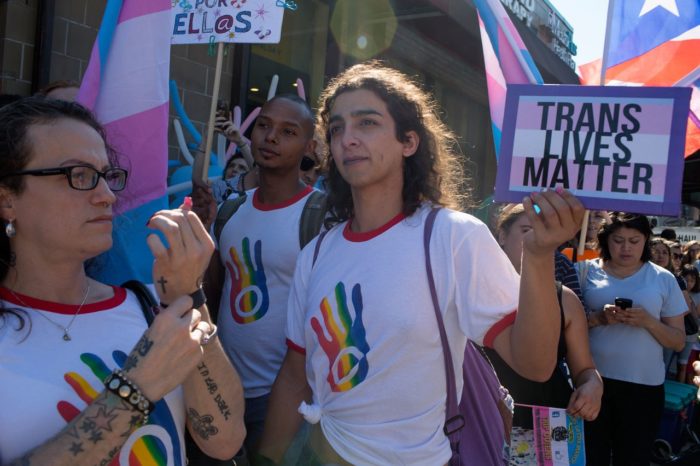* This piece originally appeared in them.us on September 10, 2018.
A vote this November on trans rights in Massachusetts could have wide-ranging national consequences.
by Shannon Minter & Jennifer Levi
This November, Massachusetts voters will be the first anywhere to be asked whether they will retain a statewide law protecting transgender people’s equal access to public places. The law, Bill S.2047, was passed in 2016 with bipartisan support and signed by a Republican governor. For over two years, it has worked to promote understanding and support for transgender people, ensuring that they can eat, shop, work, and go to school on equal footing with others. But shortly after the law’s adoption, a small group of anti-transgender activists gathered the minimum number of signatures to put the law — and the rights of transgender people — up for a popular vote. Now, residents must vote YES on Question 3 in order to keep basic protections for transgender people in place.
The law adds transgender people to equality and fairness guarantees that have existed in Massachusetts for over half a century, ensuring that people have access to restaurants, hotels, shopping malls, and other places of public accommodation on equal terms with others. These protections are critical for transgender people and other marginalized groups to be able to access public places without fear that they will be turned away or excluded simply for being who they are. As lawyers who regularly hear from people who face discrimination in a wide range of contexts, and as transgender individuals ourselves, we know all too well the challenges that transgender people navigate in these spaces and the tremendous benefit of having basic anti-discrimination protections that provide clear guidance to business owners and a baseline of equality for all people.
Over the more than 20 years that we have done this work, we have seen tremendous progress and positive change for transgender individuals. The first state to enact express state law protections for transgender people was Minnesota, in 1993. Rhode Island was the second, in 2001. Since then, 18 other states and the District of Columbia have added protections, which have been hugely influential in shaping and changing the experience of day-to-day life for transgender individuals. They mean that young people can attend school in safety and on equal terms with their peers. They mean that transgender people have been able to get jobs to support themselves and their families. And they mean that transgender people can visit stores and restaurants without being turned away.
Just as important, these laws have given transgender people an opportunity to be more visible, to participate in public life, and to share their lives and stories with others. More friends and family members have come forward to speak publicly and freely about their transgender children, parents, neighbors, colleagues, and loved ones. TV shows and movies now have more transgender characters than ever before, and social media better reflects the gender diversity that surrounds us. We are all better for this richness.
But that forward progress is at risk. We are no strangers to attempts by small but powerful groups to roll back advances in equal rights. Following the 2003 Goodridge ruling, we fought for four more years against attempts to roll back marriage equality in Massachusetts. On November 5, 2008, we all woke up to the heartbreak of the passage of Prop 8, which did turn back equality, for a time, in California.
We can’t ever let that happen again.
This November’s election in Massachusetts will be watched across the country by supporters and opponents of transgender equality. The organizers who solicited signatures to put the law up for a public vote have spoken openly about their selection of Massachusetts as the site for the battle they have waged. Massachusetts is viewed as a progressive state; it was the first to allow same-sex couples to marry, and the second to pass a law prohibiting sexual orientation discrimination. It is a solid blue state politically and has been nearly forever.










